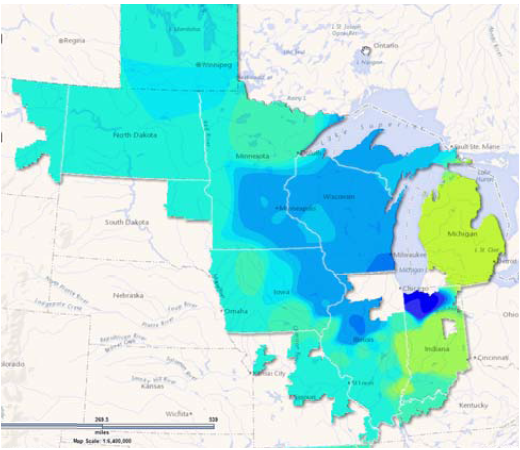By Chris O’Malley
Wisconsin Energy and Integrys Energy Group told the Federal Energy Regulatory Commission last week that their merger would not result in excessive market power and higher rates in Michigan’s Upper Peninsula, as state officials have claimed.
In their Oct. 28 filing (EC14-126), the companies sought to counter claims by opponents, including Michigan Gov. Rick Snyder, that Wisconsin Energy’s $9.1 billion acquisition of Chicago’s Integrys would stifle competition.
Snyder and Michigan Attorney General Bill Schuette told FERC in an Oct. 17 protest that the companies failed to analyze the relevant geographic market in determining market power, noting that most of the utilities’ generation is in the Wisconsin and Upper Michigan System (WUMS). (See Michigan Gov.: Wisconsin Energy-Integrys Merger Could Stifle Competition.)
While acknowledging that most of their generation capacity is located in the WUMS region, the utilities said the commission has not identified default markets within the MISO territory that are required to be analyzed in a competition analysis.
Less Congestion
Nevertheless, the utilities said they hired two analysts to evaluate whether WUMS should be evaluated as a separate geographic market. The utilities said the analysts’ findings show that transmission expansions and new generation “significantly” reduced transmission congestion into WUMS since 2007.
They also said additional transmission projects are planned for the area before the merger is scheduled to close in 2015.
“In addition, net generation capacity in WUMS has increased to the point that MISO projects a capacity surplus of 700 MW in 2016” for the zone, they wrote. “All of this evidence demonstrates that there is less reason to consider WUMS as a separate geographic market today than when the commission made its prior rulings” on the region.
The utilities presented data that they said show that prices in WUMS are lower than average prices in MISO during most periods.
Justice Department Review
The utilities, with more than 4.3 million gas and electric customers in the Midwest, said the U.S. Department of Justice closed its investigation into the competitive effects of the merger on Oct. 24.
One of the concerns raised by Michigan state officials is that the surviving utility, Wisconsin Energy, would gain a 60% ownership interest in the area’s only transmission system operator, American Transmission Co.
In their FERC filing, Wisconsin Energy and Integrys countered that ATC has transferred control over its transmission facilities to MISO. “As a consequence, regardless of what entities are deemed to control ATC and ATC management, ATC’s transmission facilities are under the control of MISO, and nothing about the merger will change that fact,” they wrote.


